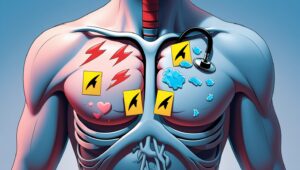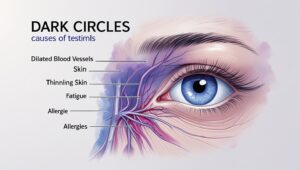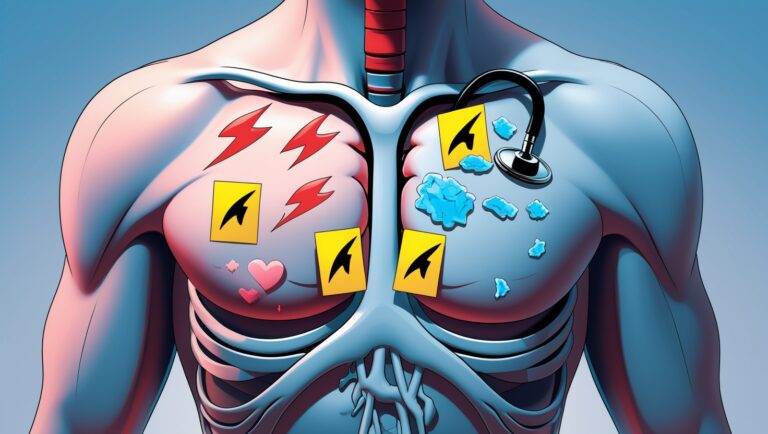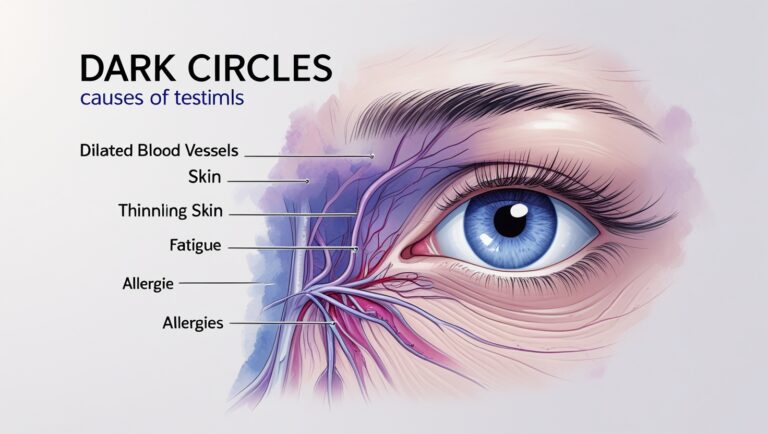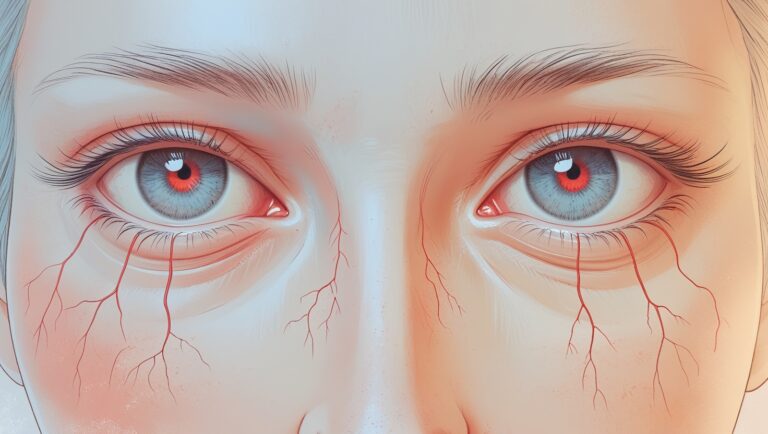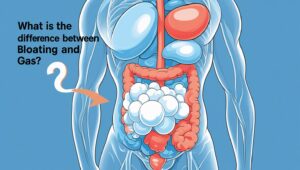Table of Contents
- Introduction
- What Is Chest Pain?
- Common Causes of Chest Pain
- When Is Chest Pain Serious?
- Real-Life Chest Pain Scenarios
- Risk Factors That Demand Attention
- Chest Pain Across Different Age Groups
- What Tests Do Doctors Use?
- At-Home Care Tips for Mild Chest Discomfort
- Mistakes to Avoid When You Feel Chest Pain
- Prevention: How to Keep Your Heart Healthy in 2025
- Final Thoughts and What to Do Next
1. Introduction
Chest pain can strike suddenly and send your mind racing. Is it gas? A pulled muscle? Or something more serious, like a heart attack? The truth is, chest pain can have many causes—some harmless, others life-threatening.
In this 2025 guide, you’ll learn when chest pain is cause for concern, what symptoms to look out for, and what steps to take if you’re unsure. Whether you’re young, middle-aged, or elderly, this article gives you the tools to take chest discomfort seriously and act confidently.
2. What Is Chest Pain?
Chest pain refers to discomfort in any area between your neck and upper abdomen. It can feel like:
- Tightness
- Burning
- Pressure
- Sharp stabbing
- Aching or cramping
Understanding where the pain is and how it feels is key to figuring out its cause.
3. Common Causes of Chest Pain
Muscular Causes
- Muscle strain: Often from heavy lifting or awkward movement
- Costochondritis: Inflammation where ribs attach to the breastbone
Symptoms: Sharp or localized pain that worsens with movement or touch.
Digestive Triggers
- Acid reflux (GERD)
- Esophageal spasms
- Gallbladder issues
Symptoms: Burning sensation, pain after eating, bloating.
Heart-Related Causes
- Angina: Reduced blood flow to the heart
- Heart attack: Blocked arteries
- Pericarditis: Inflammation around the heart
Symptoms: Pressure, squeezing, pain radiating to the jaw, arm, or back.
Lung Conditions
- Pulmonary embolism
- Pneumonia
- Collapsed lung (pneumothorax)
Symptoms: Sudden pain while breathing, coughing, shortness of breath.
Psychological Factors
- Anxiety or panic attacks
Symptoms: Rapid heartbeat, chest tightness, dizziness, fear of dying.
4. When Is Chest Pain Serious?
Key Warning Signs
Seek immediate help if you experience:
- Crushing chest pain or pressure
- Pain radiating to jaw, neck, back, or arm
- Cold sweats, nausea, or dizziness
- Trouble breathing
- Loss of consciousness or confusion
Symptoms of a Heart Attack
- Chest pressure lasting more than 5 minutes
- Discomfort that spreads
- Weakness, light-headedness, or fatigue
Heart attacks don’t always feel dramatic. Especially in women and older adults, symptoms can be subtle.
Chest Pain and Stroke Symptoms
Occasionally, chest pain can be part of a larger cardiovascular event like a stroke.
- Sudden numbness (especially on one side)
- Slurred speech
- Blurred vision
5. Real-Life Chest Pain Scenarios
Scenario 1: Chest pain after spicy food and lying down
- Likely cause: Acid reflux
- What to do: Use antacids, avoid trigger foods, don’t lie down after meals
Scenario 2: Dull ache during emotional stress
- Likely cause: Anxiety or panic attack
- What to do: Practice deep breathing, mindfulness, and relaxation techniques
Scenario 3: Pressure during rest, spreading to left arm
- Likely cause: Possible heart attack
- What to do: Call emergency services immediately
Scenario 4: Chest pain with coughing or fever
- Likely cause: Pneumonia or lung issue
- What to do: Visit a doctor for a physical exam and chest X-ray
6. Risk Factors That Demand Attention
You should be more cautious about chest pain if you have:
- High blood pressure
- Diabetes
- Smoking history
- High cholesterol
- Family history of heart disease
- Sedentary lifestyle
In 2025, wearable health tech and routine screenings can help you stay ahead of these risks.
7. Chest Pain Across Different Age Groups
Teenagers and Young Adults
- Commonly caused by anxiety, indigestion, or muscle strain
- Rarely linked to heart issues unless there’s a congenital condition
Middle-Aged Adults
- More likely to experience angina or early signs of heart disease
Older Adults (60+)
- High risk of serious conditions like heart attack or stroke
- Symptoms may be atypical (like fatigue or confusion instead of chest pain)
8. What Tests Do Doctors Use?
When you report chest pain, doctors may perform:
- ECG (Electrocardiogram): Tracks heart rhythms
- Chest X-ray: Checks lungs, bones, and heart size
- Blood tests: Look for cardiac enzymes (e.g., troponin)
- Stress test: Evaluates how your heart functions under stress
- CT scan or MRI: Provides detailed images
These tools help rule out life-threatening issues quickly.
9. At-Home Care Tips for Mild Chest Discomfort
If your pain is minor and doesn’t meet emergency criteria:
- Rest: Avoid physical strain
- Hydrate: Drink water if indigestion is suspected
- Apply heat or cold: For muscular pain relief
- Try antacids: For digestive-related discomfort
Monitor symptoms. If pain returns or worsens, call a doctor.
10. Mistakes to Avoid When You Feel Chest Pain
- Don’t delay care: Time is critical in heart conditions
- Don’t drive yourself if symptoms are severe
- Don’t ignore warning signs, even if you’re young
- Don’t self-medicate without medical advice
11. Prevention: How to Keep Your Heart Healthy in 2025
Modern medicine and lifestyle changes are making heart health more manageable. Here’s what to focus on:
- Eat heart-healthy: Lean proteins, healthy fats, vegetables
- Exercise regularly: At least 150 minutes per week
- Quit smoking: No tobacco is safe
- Sleep well: Aim for 7-8 hours each night
- Manage stress: Yoga, journaling, or nature walks
- Track your vitals: Use smartwatches or mobile health apps
12. Final Thoughts and What to Do Next
Chest pain can be harmless or life-threatening—the key is knowing how to respond. Listen to your body, act quickly when needed, and don’t hesitate to seek help.
Take Action Now:
- Keep emergency numbers saved on your phone
- Get a heart health check-up if you have risk factors
- Share this guide with loved ones to raise awareness
Your health is your wealth. Pay attention to your symptoms, and never take chest pain lightly.
Visit for more :- Greakstive
External References & Further Reading:
